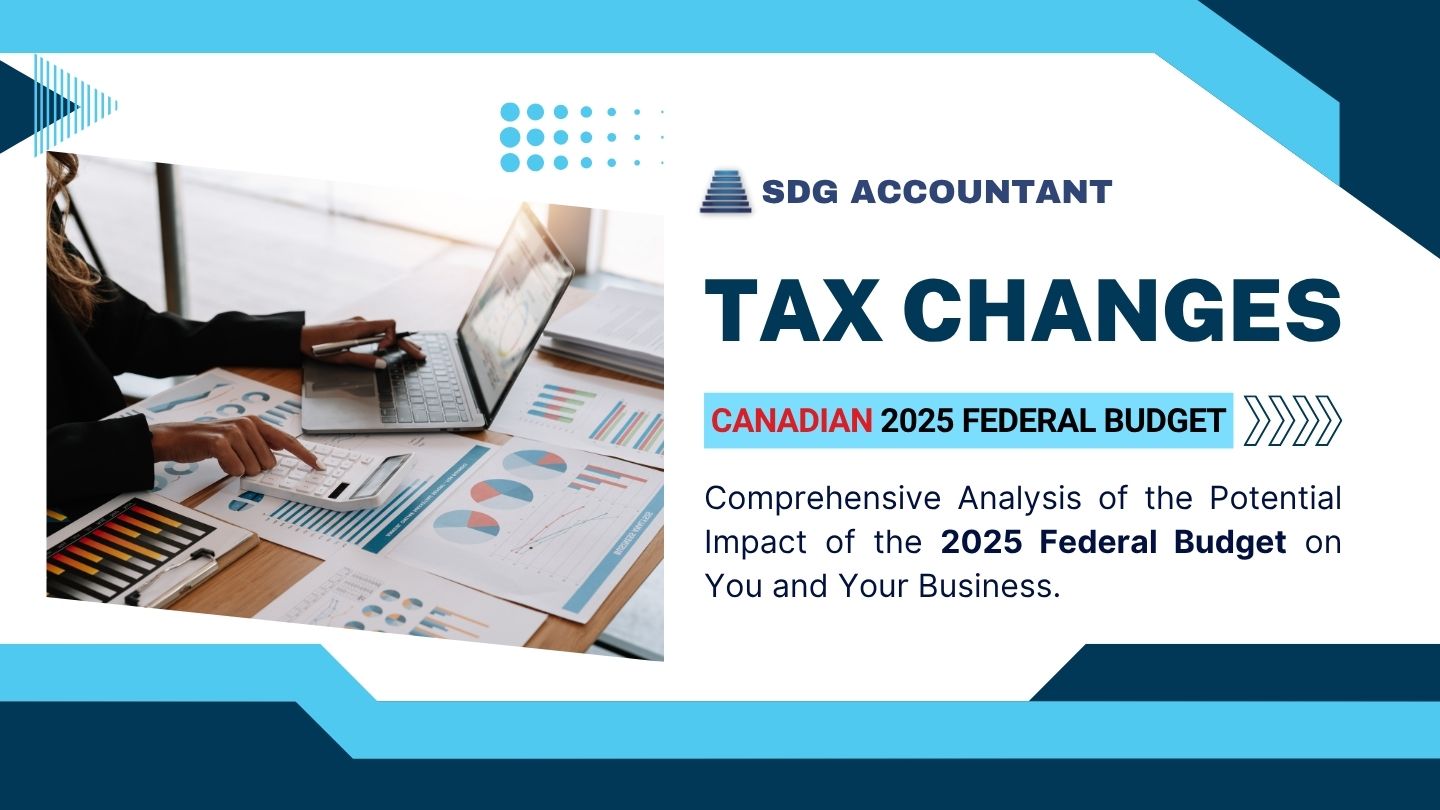
Important Changes in Therapy Taxation
Exciting developments are underway for therapy services across Canada! Following extensive efforts, many therapy services will now be exempt from GST/HST starting June 20, 2024,

On November 4, 2025, the Ministry of Finance released Budget 2025: Building Canada’s Strength. The proposed budget changes can affect your tax situation, whether you are a business, an individual, or an investor. Below is a clear, easy-to-understand summary of all the essential changes to help you plan.
SDG Accountant grouped by focus area, here are the selected tax measures in the 2025 Canadian Federal Budget for individuals and businesses:
Here are the proposed measures that aim to impact businesses by imposing a fair tax system.
This measure proposes immediate expensing of 100% of the cost of eligible M&P buildings acquired before 2030, compared to the 10% CCA allowance previously. This is a huge advantage for businesses, as it will also allow a write-off of the full cost of manufacturing equipment, productivity tools (such as patents, computers, and data networks), and clean-technology assets. The immediate expensing will gradually phase out after 2030. Keep in mind that there is a requirement to meet the minimum 90% of floor space that must be used for M&P purposes.
The SR&ED program enhancements propose increasing the tax credit expenditure limit for Canadian-controlled private corporations (CCPCs) from $4.5 million to $6 million. Additionally, the budget proposes increasing the phase-out range for the enhanced credit from $10-15 million to $15-75 million. This allows more businesses to access the improved credit and to set a higher expenditure limit. The credit is now also eligible for certain Canadian public corporations and is only effective for taxation years beginning on or after Dec. 16, 2024.

Exciting developments are underway for therapy services across Canada! Following extensive efforts, many therapy services will now be exempt from GST/HST starting June 20, 2024,
This measure plans to extend the lifetime of the higher credit rates for the Carbon Capture, Utilization, and Storage (CCUS) ITC until 2035 instead of 2030.
The proposal also expands the critical minerals eligible for the Clean Technology Manufacturing ITC to include antimony, gallium, indium, germanium, and scandium. This eligibility expansion only applies to property acquired or available for use on or after November 4, 2025.
The Canadian transfer pricing framework is proposed for an update to align with OECD guidelines. This would encourage new methodologies for transactions involving non-arm’s-length or cross-border matters.
Tiered corporate structures, such as holding companies with staggered year-ends, will see reduced tax deferral strategies. The measure will suspend the dividend refund for a payer corporation until the corporation’s tax liability has been adequately accounted for.
The budget expands the anti-avoidance provision in the 21-year deemed disposition rules by now applying it to indirect property transfers between trusts, including those made through a corporation.
The Underused Housing Tax (UHT) will no longer be available starting in 2025; therefore, no filings will be required from 2025 onwards.
Effective November 5, 2025, the measure plans to remove the luxury tax previously applicable to specific aircraft and vessels.
A new measure is proposed as the Telecommunications Reverse Charge Mechanism (RCM) that plans to reduce fraud risks by shifting the GST/HST reporting to the purchaser.
The budget proposes reducing the federal individual tax bracket from 15% to 14.5% in 2025 and to 14% in 2026 and subsequent tax years.
A new non-refundable top-up tax credit of 15% on amounts that exceed the first individual tax bracket is also proposed.
The measure proposes a new temporary, refundable tax credit of 5% of eligible earnings (up to $1,100 annually) for personal support workers (PSWs) employed in qualified health-care facilities, such as hospitals, nursing homes, and home-care services. This credit would be available from 2026 to 2030.

A foreign tax credit is available to any taxpayer who has been a resident of Canada and earned worldwide income at any time during the
The budget plans to revise the definition of “qualified investments” for RRSPs, TFSAs, RRIFs, RESPs, FHSAs, RDSPs, and DDSPs to simplify the rules. This measure would also affect small business investment eligibility.
Starting 2026, taxpayers can no longer claim the same expenses under the Home Accessibility Tax Credit (HATC) and the Medical Expense Tax Credit (METC).
The budget also introduces an automatic filing system for low-income taxpayers to ensure they have access to benefits.
If you owe taxes and cannot make the payment immediately, contact the CRA and explain your situation before they approach you. This will help you maintain better control over the situation. If you are seeking advice on how to deal with this situation, SDG Accountants, Toronto Tax Experts, are ready to assist you.
Start My Tax PrepBudget 2025 plans to propose many new changes, as summarized above, and will impact tax planning for both individuals and corporations in Canada. Our clients in Toronto should pay close attention to these changes and their implications if Parliament passes them.
If you wish to learn more about the effect of these proposals on your specific tax situation, please get in touch with our Toronto Tax Accountant at (416) 755-3000.
The information is not intended to constitute professional advice and may not be appropriate for a specific individual or fact situation. It is written by the author solely in their personal capacity and cannot be attributed to the accounting firm with which they are affiliated. It is not intended to constitute professional advice, and neither the author nor the firm with which the author is associated shall accept any liability in respect of any reliance on the information contained herein. Readers should always consult with their professional advisors in respect of their particular situations.
— Sami Ghaith
CPA, CGA, MBA